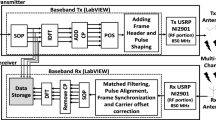Abstract
A time-domain (TD) least square (LS) channel estimator is first proposed to estimate channel parameters of OFDM system with IQ imbalances at both transmitter and receiver. Then, an iterative shrinkage (IS) algorithm from compressed sensing is adopted to further improve the estimation performance by using the TD-LS solution as the initial value of IS in the case of sparse channel. Simulation shows that our algorithm combining TD-LS and IS performs better on bit error rate than the frequency-domain LS and matching pursuit in sparse Hilly Terrain channel when the same LS equalizer is adopted.
Similar content being viewed by others
References
Bajwa W U, Haupt J, Sayeed A M, et al. Compressed channel sensing: a new approach to estimating sparse multipath channels. Proc IEEE, 2010, 98: 1058–1076
ETSI ES 201 980. Digital Radio Mondiale (DRM). System Specification. V3.1.1. 2009
Shu F, Lee J, Wu L N, et al. Time-frequency channel estimation for digital amplitude modulation broadcasting system based on OFDM. IEE Proc Commun, 2003, 150: 259–264
Cotter S F, Rao B D. The adaptive matching pursuit algorithm for estimation and equalization of sparse time-varying channels. In: 34th Asilomar Conference on Signals, Systems and Computers, Pacific Grove, 2000. 1772–1776
Cotter S F, Rao B D. Sparse channel estimation via matching pursuit with application to equalization. IEEE Trans Commun, 2002, 50: 374–377
Wang D M, Sheng B, Zhao J H, et al. Channel estimation algorithms for broadband MIMO-OFDM sparse channel. In: Proc IEEE Int Symp Personal Indoor Mobile Radio Communication, Beijing, 2003. 1929–1933
Wu C J, Lin D W. A group matching pursuit algorithm for sparse channel estimation for OFDM transmission. In: Proc IEEE Int Conf Acoust Speech Signal Process, Toulouse, 2006. 429–432
Kocic M, Brady D, Merriam S. Reduced-complexity RLS estimation for shallow-water channels. In: Proc Symp Autonom Underwater Veh Technol, Cambridge, MA, 1994. 165–170
Raghavendra M R, Giridhar K. Improving channel estimation in OFDM systems for sparse multipath channels. IEEE Signal Process Lett, 2005, 12: 52–55
Carbonelli C, Vedantam S, Mitra U. Sparse channel estimation with zero tap detection. IEEE Trans Wirel Commun, 2007, 6: 1743–1753
Tauböck G, Hlawatsch F. A compressed sensing technique for OFDM channel estimation in mobile environments: exploiting channel sparsity for reducing pilot. In: International Conference on Acoustics, Speech, and Signal Processing (ICASSP), Las Vegas, 2008. 2885–2888
Tauböck G, Hlawatsch F. Compressed Sensing based estimation of doubly selective channels using a sparsity-optimized basis expansion. In: European Signal Processing Conference (EUSIPCO), Lausanne, 2008. 25–29
Haupt J, Bajwa W U, Raz G, et al. Toeplitz compressed sensing matrices with applications to sparse channel estimation. IEEE Trans Inform Theory, 2010, 56: 5862–5875
Berger C R, Zhou S L, Preisig J C, et al. Sparse channel estimation for multicarrier underwater acoustic communication: from subspace methods to compressed sensing. IEEE Trans Signal Process, 2010, 58: 1708–1721
Tarighat A, Sayed A H. Joint compensation of transmitter and receiver impairments in OFDM systems. IEEE Trans Wirel Commun, 2007, 6: 240–247
Zhu H L, Wang J Z. Chunk-based resource allocation in OFDMA systems-part I: chunk allocation. IEEE Trans Commun, 2009, 57: 2734–2744
Zhu H L, Wang J Z. Chunk-based resource allocation in OFDMA systems-part II: joint chunk, power and bit allocation. IEEE Trans Commun, 2012, 60: 499–509
Shu F, Stevan B, Wang D M, et al. ML integer frequency offset estimation for OFDM systems with null subcarriers: estimation range and pilot design. Sci China Inf Sci, 2010, 53: 2567–2575
Gao T, Zhou F, Li W, et al. A 6.2–9.5 GHz receiver for Wimedia MB-OFDM and China UWB standard. Sci China Inf Sci, 2011, 54: 407–418
Chen Y F, Fan J H. A current-mode RF transmitter for 6–9 GHz MB-OFDM UWB application. Sci China Inf Sci, 2011, 54: 419–428
Zhang H, Dai X H, Pan D R. Linearly time-varying channel estimation and training power allocation for OFDM/MIMO systems using superimposed training. Sci China Inf Sci, 2011, 54: 1456–1470
Zibulevky M, Elad M. L1–L2 optimization in signal and image processing. IEEE Signal Process Mag, 2010, 27: 76–82
Bruckstein A M, Donoho D L, Elad M. From sparse solutions of systems of equations to sparse modeling of signals and images. SIAM Rev, 2009, 51: 34–81
Elad M. Sparse and Redudant Representation: From Theory to Applications in Signal and Image Processing. Heidelberg: Springer, 2010
ETSI TR 125 943. Universal Mobile Telecommunications System (UMTS). Deployment aspects. 3GPP TR 25.943, Ver 5.1.0, Release 5. 2002-06
Author information
Authors and Affiliations
Corresponding author
Rights and permissions
About this article
Cite this article
Shu, F., Zhao, J., You, X. et al. An efficient sparse channel estimator combining time-domain LS and iterative shrinkage for OFDM systems with IQ-imbalances. Sci. China Inf. Sci. 55, 2604–2610 (2012). https://doi.org/10.1007/s11432-012-4691-7
Received:
Accepted:
Published:
Issue Date:
DOI: https://doi.org/10.1007/s11432-012-4691-7




